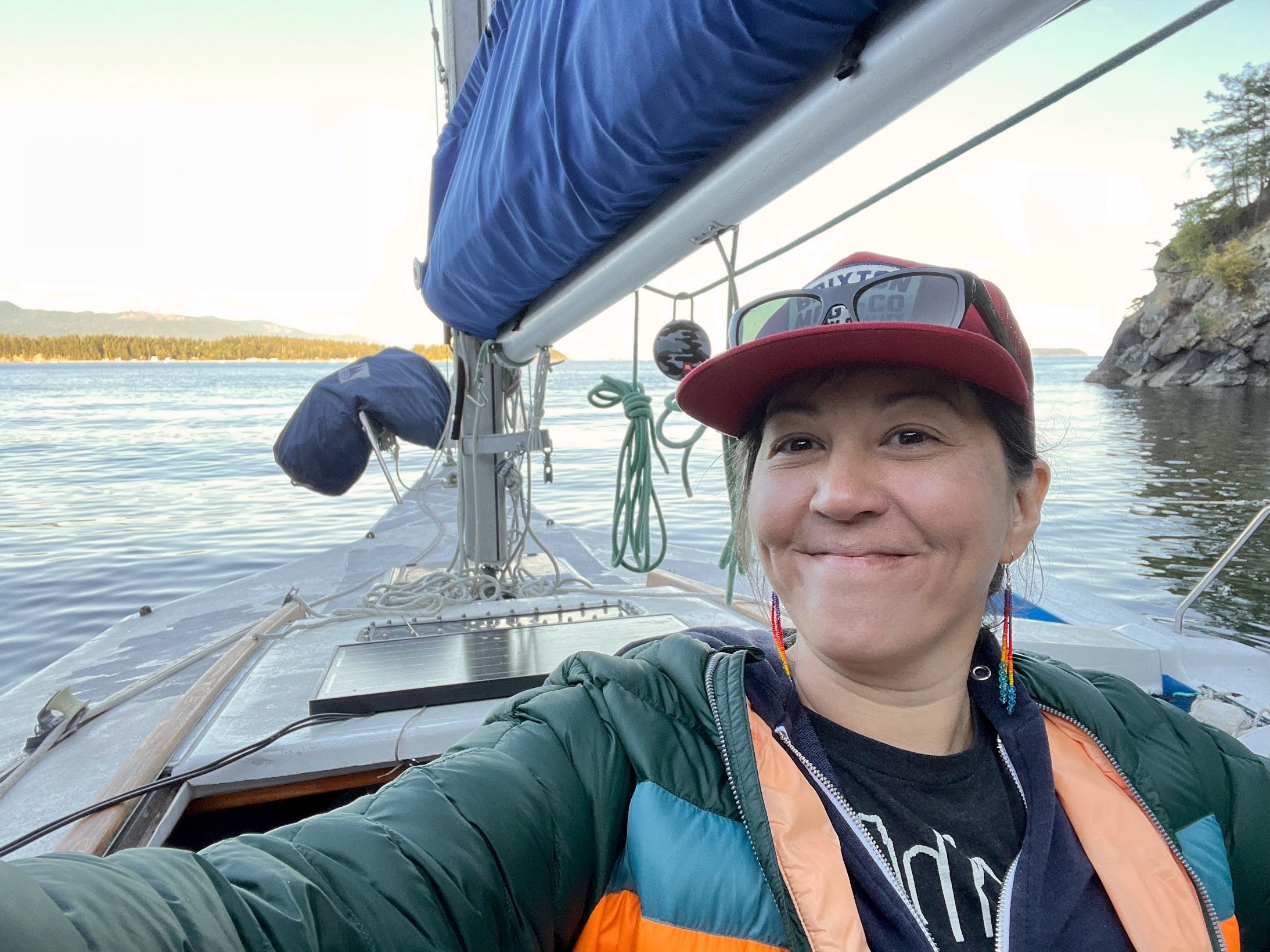Rena Priest (she/her)
Rena Priest is an enrolled member of the Lummi Nation. She served as the 6th Washington State Poet Laureate and was named the 2022 Maxine Cushing Gray Distinguished Writing Fellow. Priest is also the recipient of an Allied Arts Foundation Professional Poets Award and fellowships from the Academy of American Poets, Indigenous Nations Poets, Nia Tero, and the Vadon Foundation.
Her debut collection, Patriarchy Blues, received an American Book Award. Her second collection, Sublime Subliminal, was published as the finalist for the Floating Bridge Press Chapbook Award. Her most recent book, Northwest Know-How: Beaches, includes poems, retellings of legends, and fun descriptions of 29 of the most beloved beaches in the Pacific Northwest.
In 2021 she worked as an editor on an anthology of literature by Native Arts and Cultures Foundation’s National Artist grantees. In 2022, with the support of the Academy of American Poets, the Washington Center for the Book, Washington State Libraries, Humanities Washington, and the Washington State Arts Commission, she edited an anthology of salmon poetry featuring 167 Washington state poets.
In 2018 she was awarded a National Geographic Explorer’s Grant to follow the ongoing efforts to repatriate a captive Southern Resident Orca from Seaquarium in Miami. Priest’s nonfiction has appeared in High Country News, YES! Magazine, Seattle Met, and elsewhere. She holds an MFA from Sarah Lawrence College. Learn more at renapriest.com
Andrea Reid (she/her)
Dr. Andrea Reid is a citizen of the Nisg̱a’a Nation, a descendant of the Gisk’aast/Killerwhale, with her paternal family coming from Ging̱olx clan (Wilps Daax̱an). She was raised, however, on Epekwitk/Prince Edward Island by her mother (of Irish ancestry) and brothers, and now lives in the Nass River Valley, home of her Nation, in Lax̱g̱alts’ap.
Dr. Reid joined the Institute for the Oceans and Fisheries at the University of British Columbia as an assistant professor in 2021, and is now a Canada Research Chair in Indigenous Fisheries Science (Tier 2). She has launched and now leads the Centre for Indigenous Fisheries, committed to research and teaching approaches that are intergenerational, land-based, and profoundly relational. The Centre is a majority-Indigenous collective working to build momentum and action in support of the study and protection of culturally-significant fish and fisheries – from rockfish, to salmon, to oolichan, to crab, and more!
Mentoring students and young people is a key commitment for Dr. Reid. In addition to leading spring and summer fish science camps for Nisg̱a’a youth, Dr. Reid is also a co-founder and co-director of a Canadian charity Riparia that connects young women and science on the water through multi-day paddling trips every summer.
Dr. Reid is also a National Geographic Explorer and a Fellow International of The Explorers Club. She is committed to working with colleagues and partners to redefine so-called exploration and to show the promise and power of community-partnered work that centres consent and collaboration.
Lauren Eckert (she/her)
Dr. Lauren Eckert is a Conservation Scientist and storyteller, and postdoctoral fellow at the University of British Columbia in the Centre for Indigenous Fisheries and currently lives in the qathet Regional District (Tla’amin territory).
Lauren’s early research experiences around the globe exposed her to the complexities of interrelated social and ecological systems and motivated her to delve deeper into conservation science that recognizes humans’ important role in global ecosystems, engages communities directly in conservation, and supports human well-being and rights alongside ecosystem protection. Her MSc at the University of Victoria bridged Indigenous knowledge and ecological science through a community-engaged, Indigenous-led approach to conservation in partnership with Central Coast First Nations.
Lauren completed her PhD at the University of Victoria where she studied marine and terrestrial ecosystems, the intersections of Indigenous and Western sciences, relationships between humans and wildlife (with a focus on bears), and sought to better understand and transform conflict that stymies conservation efforts.
Lauren is also an endlessly excitable naturalist. She believes in a world of multi-cultural, multi-species flourishing, and hopes to support the ushering in of that world by sharing her knowledge (and awe) of the natural world. Lauren is a Canada Vanier Scholar, Raincoast Conservation Fellow, National Geographic Explorer, dog mom, avid hiker, caver, scuba diver, and peanut butter aficionada.
Amy Romer (she/her)
Amy Romer is an award-winning multimedia journalist living on the unceded territories of the Skwxwú7mesh (Squamish), səlilwətaʔɬ (Tsleil-Waututh) and xwməθkwəýəm (Musqueam) Nations.
Romer’s journalism, which centres trauma-informed practices, has been published widely in outlets including The Walrus, IndigiNews, The Globe and Mail, Reuters, The Narwhal, The Tyee and The Guardian. also works as a photographer and storyteller for social-cause nonprofits and organizations.
Romer’s photojournalism work has been exhibited internationally at festivals and solo exhibitions, and her leading work on modern slavery in Britain was published as a book in 2019.
In 2023, Romer was nominated by the National Media Awards Foundation and Jack Webster Awards for Excellence in Feature Writing for ‘“The New Residential School System”: How a First Nation Rallied against the Foster Care System’, published by The Walrus.
Romer is funded by the Local Journalism Initiative through IndigiNews to report on child “welfare” stories, and by the Trebek Initiative to produce a podcast on ecological grief, currently in production (2024-2025).

Do you have a story to tell?
Learn more about how you can share your story.



